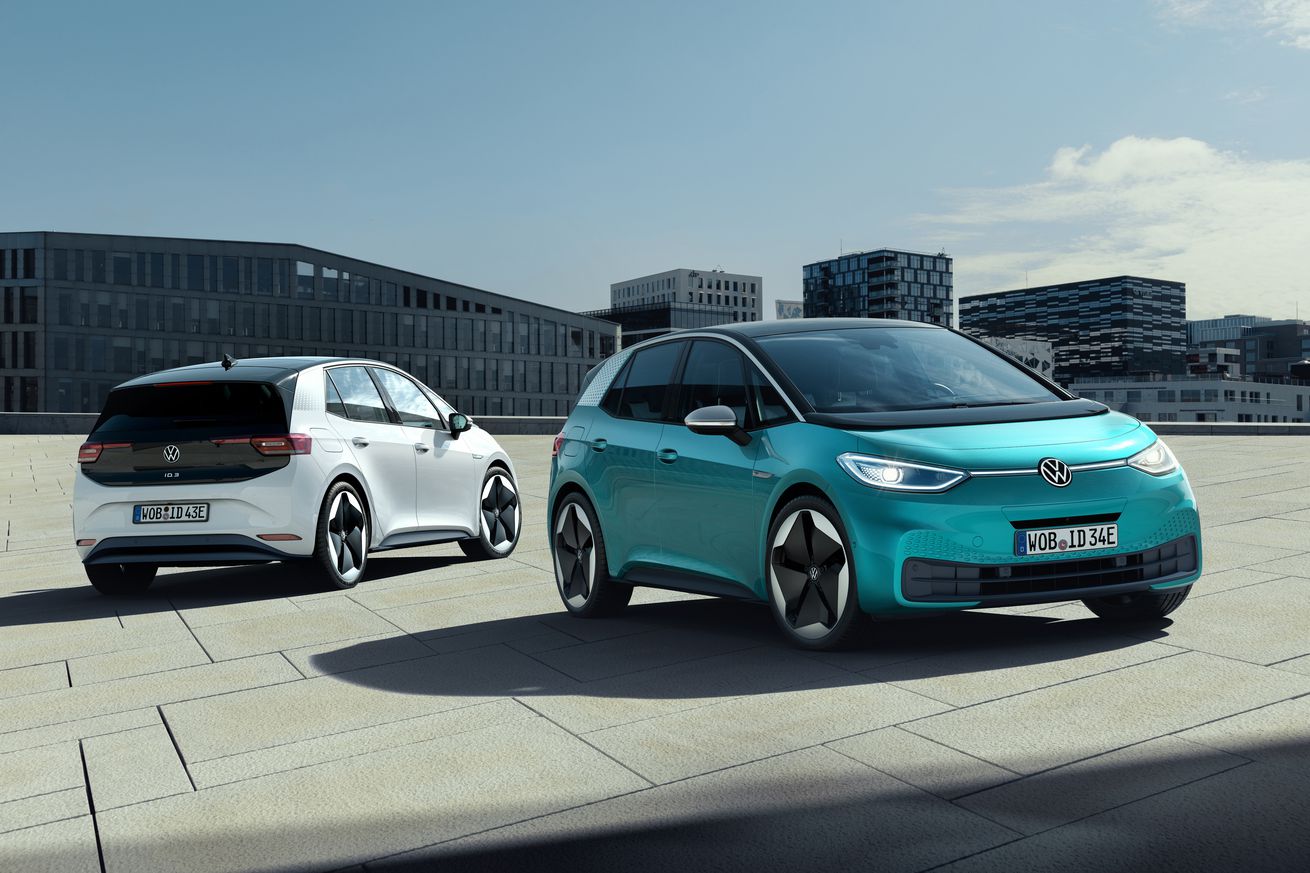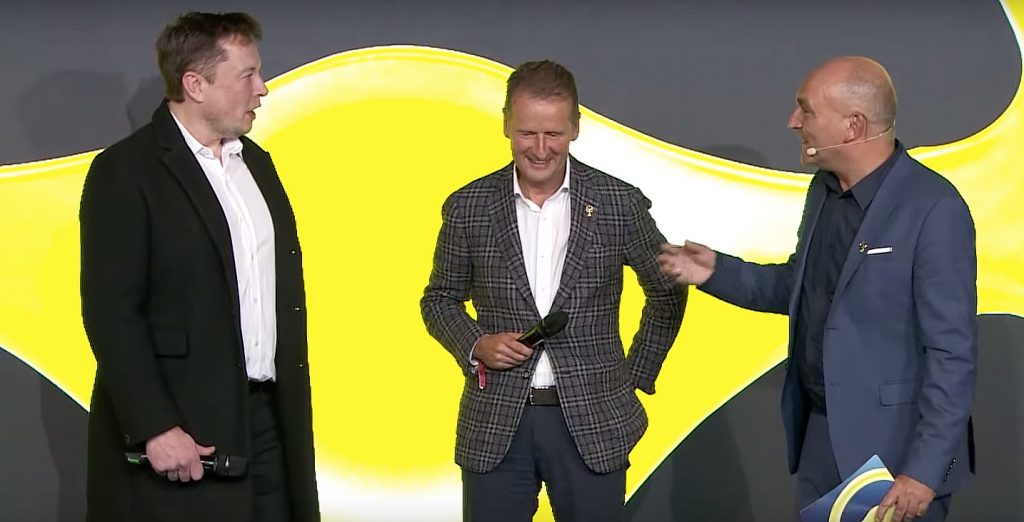

News
VW ID.3 software failures have cost Tesla and Elon Musk a key ally in the EV transition
The automotive sector’s transition to electric mobility is undeniable at this point, but the pace of the transition itself depends largely on the number of automakers that dedicate themselves seriously to EVs. While Tesla is at the forefront of this change with the Model S,3,X, and Y, the company needs all the help it can get from veteran automakers to foster the adoption of sustainable transportation as quickly as possible.
For some time now, one of Tesla and CEO Elon Musk’s key ally in the emerging electric vehicle sector is Herbert Diess, a huge proponent of EVs. Musk and Diess have expressed their support for each other openly, both on Twitter and in previous interviews. This was particularly evident during the 2019 Golden Steering Wheel Awards in Berlin, when both executives traded compliments as they showed their optimism about the electric vehicle sector.
Unfortunately, circumstances surrounding the Volkswagen ID.3, the first of the German automaker’s flagship line of all-electric vehicles, may have resulted in Diess being stripped of his role as the chairman of the Volkswagen brand. According to a Wall Street Journal report, part of the reason behind Diess’ removal had to do with the ID.3’s delays, particularly regarding the vehicles’ in-car software.

The Volkswagen ID.3 was poised to be the German automaker’s answer to the Tesla Model 3, a vehicle that may even be considered as the second coming of the ubiquitous Beetle. The vehicle has been in the works for years now, and much progress has been made towards its release. The ID.3 actually entered production, but there was one glaring issue — its software had numerous issues, preventing the car from bring cleared for deliveries.
These software issues were severe, with previous reports pointing to dozens of bugs being posted by test drivers practically every day. Reports also pointed to release dates for the vehicle being pushed back, and in the Wall Street Journal’s recent report, the publication noted that the ID.3 had actually been delayed a second time. Some versions of the car are reportedly poised to be delivered this September, but cloud-connected units are not due to come out until the end of this year.
Cloud connectivity is a key aspect of the Volkswagen ID.3, as it would allow the German automaker to provide a user experience not unlike the one offered by Tesla and its constant over-the-air software updates. Reports have indicated that Volkswagen’s software engineers have not been able to accomplish this, despite the company’s cloud-based applications being developed with Microsoft.
A report from Germany’s Auto Motor und Sport has noted that Diess’ replacement would likely be Oliver Blume, who is Porsche’s CEO. Blume, while not openly friendly to Tesla and Elon Musk as Diess, has something tangible under his belt: the Taycan, an all-electric car that is actually being delivered to customers today. But it should be noted that the Taycan is more of a true driver’s car that just happens to be electric, instead of a Model 3 rival that is reasonably priced and bleeding with tech.
Hopefully, the loss of Diess at Volkswagen’s helm will not become a roadblock to the established automaker’s transition to electric cars. The era of electric vehicles seems to be at hand, after all, with the emergence of technologies such as a million-mile battery and vehicles that near price parity with internal combustion cars.
News
Tesla cleared in Canada EV rebate investigation
Tesla has been cleared in an investigation into the company’s staggering number of EV rebate claims in Canada in January.

Canadian officials have cleared Tesla following an investigation into a large number of claims submitted to the country’s electric vehicle (EV) rebates earlier this year.
Transport Canada has ruled that there was no evidence of fraud after Tesla submitted 8,653 EV rebate claims for the country’s Incentives for Zero-Emission Vehicles (iZEV) program, as detailed in a report on Friday from The Globe and Mail. Despite the huge number of claims, Canadian authorities have found that the figure represented vehicles that had been delivered prior to the submission deadline for the program.
According to Transport Minister Chrystia Freeland, the claims “were determined to legitimately represent cars sold before January 12,” which was the final day for OEMs to submit these claims before the government suspended the program.
Upon initial reporting of the Tesla claims submitted in January, it was estimated that they were valued at around $43 million. In March, Freeland and Transport Canada opened the investigation into Tesla, noting that they would be freezing the rebate payments until the claims were found to be valid.
READ MORE ON ELECTRIC VEHICLES: EVs getting cleaner more quickly than expected in Europe: study
Huw Williams, Canadian Automobile Dealers Association Public Affairs Director, accepted the results of the investigation, while also questioning how Tesla knew to submit the claims that weekend, just before the program ran out.
“I think there’s a larger question as to how Tesla knew to run those through on that weekend,” Williams said. “It doesn’t appear to me that we have an investigation into any communication between Transport Canada and Tesla, between officials who may have shared information inappropriately.”
Tesla sales have been down in Canada for the first half of this year, amidst turmoil between the country and the Trump administration’s tariffs. Although Elon Musk has since stepped back from his role with the administration, a number of companies and officials in Canada were calling for a boycott of Tesla’s vehicles earlier this year, due in part to his association with Trump.
News
Tesla Semis to get 18 new Megachargers at this PepsiCo plant
PepsiCo is set to add more Tesla Semi Megachargers, this time at a facility in North Carolina.

Tesla partner PepsiCo is set to build new Semi charging stations at one of its manufacturing sites, as revealed in new permitting plans shared this week.
On Friday, Tesla charging station scout MarcoRP shared plans on X for 18 Semi Megacharging stalls at PepsiCo’s facility in Charlotte, North Carolina, coming as the latest update plans for the company’s increasingly electrified fleet. The stalls are set to be built side by side, along with three Tesla Megapack grid-scale battery systems.
The plans also note the faster charging speeds for the chargers, which can charge the Class 8 Semi at speeds of up to 1MW. Tesla says that the speed can charge the Semi back to roughly 70 percent in around 30 minutes.
You can see the site plans for the PepsiCo North Carolina Megacharger below.

Credit: PepsiCo (via MarcoRPi1 on X)

Credit: PepsiCo (via MarcoRPi1 on X)
READ MORE ON THE TESLA SEMI: Tesla to build Semi Megacharger station in Southern California
PepsiCo’s Tesla Semi fleet, other Megachargers, and initial tests and deliveries
PepsiCo was the first external customer to take delivery of Tesla’s Semis back in 2023, starting with just an initial order of 15. Since then, the company has continued to expand the fleet, recently taking delivery of an additional 50 units in California. The PepsiCo fleet was up to around 86 units as of last year, according to statements from Semi Senior Manager Dan Priestley.
Additionally, the company has similar Megachargers at its facilities in Modesto, Sacramento, and Fresno, California, and Tesla also submitted plans for approval to build 12 new Megacharging stalls in Los Angeles County.
Over the past couple of years, Tesla has also been delivering the electric Class 8 units to a number of other companies for pilot programs, and Priestley shared some results from PepsiCo’s initial Semi tests last year. Notably, the executive spoke with a handful of PepsiCo workers who said they really liked the Semi and wouldn’t plan on going back to diesel trucks.
The company is also nearing completion of a higher-volume Semi plant at its Gigafactory in Nevada, which is expected to eventually have an annual production capacity of 50,000 Semi units.
Tesla executive teases plan to further electrify supply chain
News
Tesla sales soar in Norway with new Model Y leading the charge
Tesla recorded a 54% year-over-year jump in new vehicle registrations in June.

Tesla is seeing strong momentum in Norway, with sales of the new Model Y helping the company maintain dominance in one of the world’s most electric vehicle-friendly markets.
Model Y upgrades and consumer preferences
According to the Norwegian Road Federation (OFV), Tesla recorded a 54% year-over-year jump in new vehicle registrations in June. The Model Y led the charge, posting a 115% increase compared to the same period last year. Tesla Norway’s growth was even more notable in May, with sales surging a whopping 213%, as noted in a CNBC report.
Christina Bu, secretary general of the Norwegian EV Association (NEVA), stated that Tesla’s strong market performance was partly due to the updated Model Y, which is really just a good car, period.
“I think it just has to do with the fact that they deliver a car which has quite a lot of value for money and is what Norwegians need. What Norwegians need, a large luggage space, all wheel drive, and a tow hitch, high ground clearance as well. In addition, quite good digital solutions which people have gotten used to, and also a charging network,” she said.
Tesla in Europe
Tesla’s success in Norway is supported by long-standing government incentives for EV adoption, including exemptions from VAT, road toll discounts, and access to bus lanes. Public and home charging infrastructure is also widely available, making the EV ownership experience in the country very convenient.
Tesla’s performance in Europe is still a mixed bag, with markets like Germany and France still seeing declines in recent months. In areas such as Norway, Spain, and Portugal, however, Tesla’s new car registrations are rising. Spain’s sales rose 61% and Portugal’s sales rose 7% last month. This suggests that regional demand may be stabilizing or rebounding in pockets of Europe.
-

 Elon Musk2 weeks ago
Elon Musk2 weeks agoTesla investors will be shocked by Jim Cramer’s latest assessment
-

 Elon Musk2 days ago
Elon Musk2 days agoxAI launches Grok 4 with new $300/month SuperGrok Heavy subscription
-

 Elon Musk4 days ago
Elon Musk4 days agoElon Musk confirms Grok 4 launch on July 9 with livestream event
-

 News1 week ago
News1 week agoTesla Model 3 ranks as the safest new car in Europe for 2025, per Euro NCAP tests
-

 Elon Musk2 weeks ago
Elon Musk2 weeks agoA Tesla just delivered itself to a customer autonomously, Elon Musk confirms
-

 Elon Musk1 week ago
Elon Musk1 week agoxAI’s Memphis data center receives air permit despite community criticism
-

 News2 weeks ago
News2 weeks agoXiaomi CEO congratulates Tesla on first FSD delivery: “We have to continue learning!”
-

 News2 weeks ago
News2 weeks agoTesla sees explosive sales growth in UK, Spain, and Netherlands in June
















